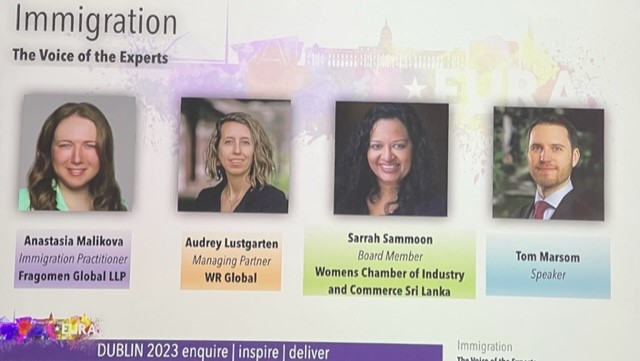In this look around the globe, find the latest immigration news regarding Australia’s Temporary Salary Migration Income Threshold , Canada’s federal worker’s strike, the Hague Convention on Apostilles and much more!
But first, we start with this month’s WReview.
WReview: WR Immigration at EuRA
The WR Immigration team recently attended the European Relocation Association (EuRA) conference in Dublin, Ireland.
Highlights included:
- Hearing both Simon Coveney, Minister for Enterprise, Trade and Employment and Neale Richmond, Minister of State at the Department of Enterprise, Trade and Employment speak about Ireland’s history as a country of emigration and current place as a hot destination for employment-based immigration.
- Our Managing Partner of WR Global, Audrey Lustgarten, speaking on the Immigration – The Voice of the Experts panel.
- Meeting with dozens of our colleagues and clients from Europe and beyond.
- Continuing the theme of reaching across cultures during our down time by sharing a delicious, spicy Sichuan meal with colleagues from Singapore in the heart of Dublin.


Australia: Temporary Salary Migration Income Threshold Increased
The government will increase the Temporary Salary Migration Income Threshold (TSMIT) from AUD 53,900 to AUD 70,000 for all new subclass 482 work visa applications filed from July 1, 2023 onwards. The market salary for the occupation a foreign national will be offered must be greater than the TSMIT. If the market salary for the occupation is lower than the TSMIT, it is not possible to sponsor a foreign worker for a subclass 482 work visa for the role. Note that if the market salary for an occupation is higher than the TSMIT then the foreign worker must be paid more than the TSMIT. This change in the income threshold will decrease the number of occupations in which it is possible for employers to sponsor foreign workers.
Canada: Federal Worker Strike Ends
A deal has been reached to end the federal worker strike that began on April 19. Workers have returned to their jobs as of May 1. The strike impacted processing of a number of types of Canadian immigration applications but given the relatively short duration we are optimistic that the long-term impact to processing times will be minimal.
China: Hague Convention on Apostilles
China has finally agreed to join the Hague Convention on Apostilles. This means that supporting documents required for visa and residence permit applications, such as marriage certificates and diplomas, will now be able to be apostilled in a single step rather than going through a multi-step legalization process to be considered valid for use in China. China’s accession to the treaty is expected to be effective as of November 7, 2023.
Portugal: Golden Visa Investment Program to Close
Portugal is expected to close its Golden Visa investment program as of mid to late June, so the window of time during which to apply is rapidly closing. In good news, the government has scrapped an initial closure law that would have retroactively cancelled applications in process and impacted those already holding Golden Visas.


